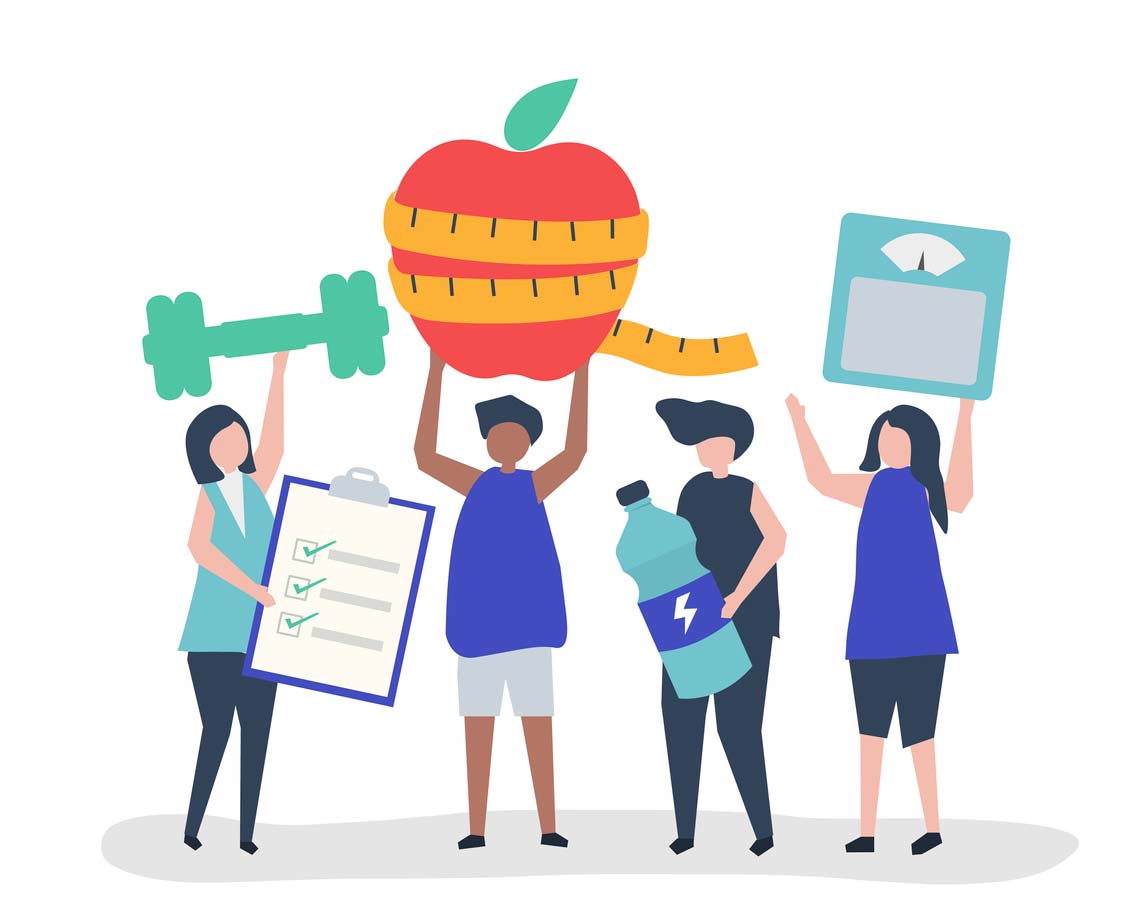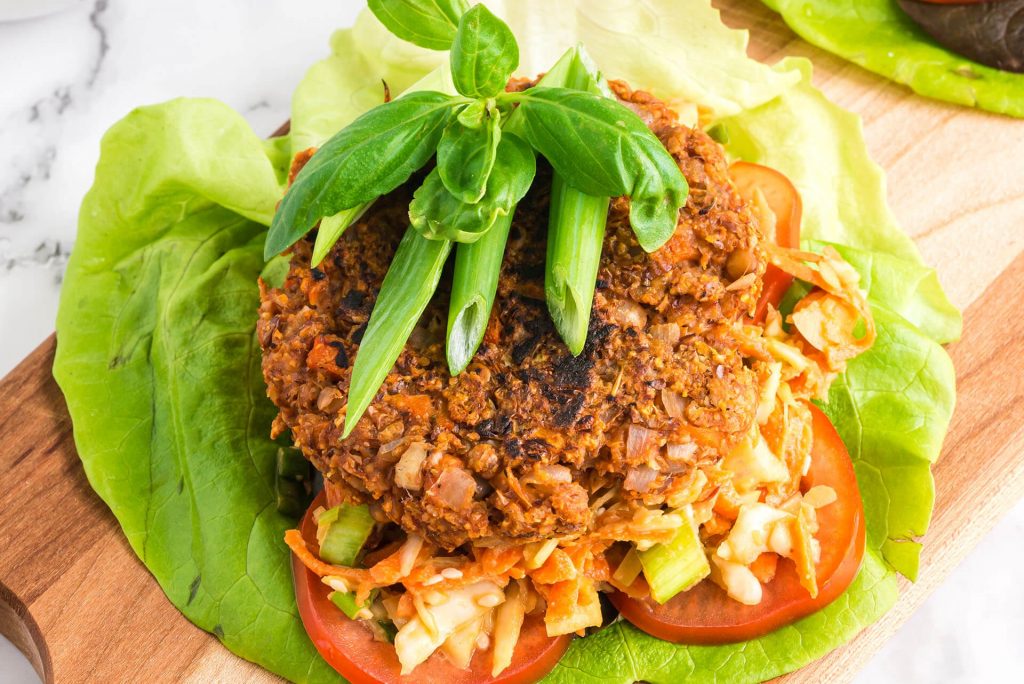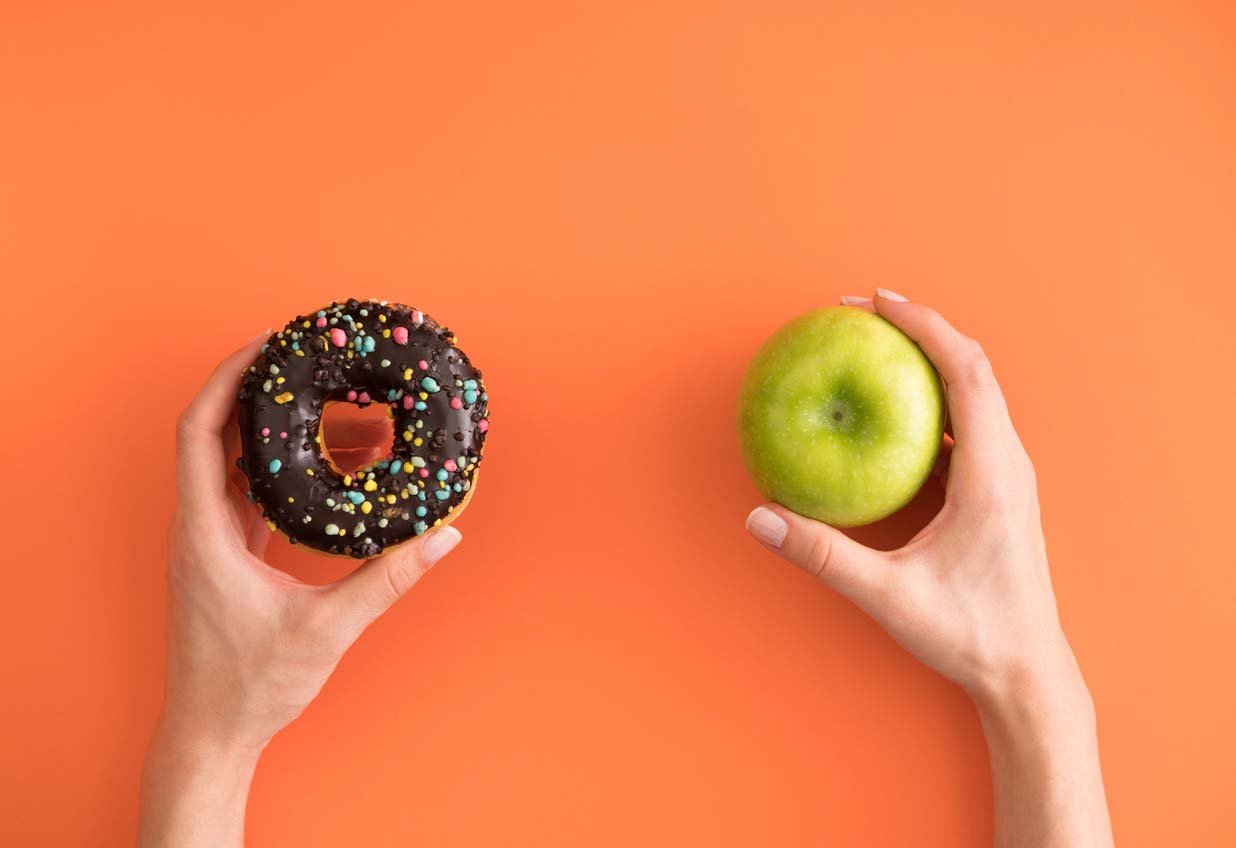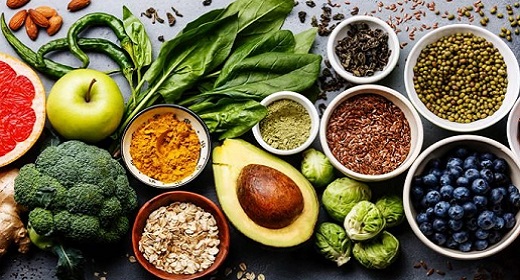by Ocean Robbins: In the decade since my dad and colleague, John Robbins, and I started Food Revolution Network…
we’ve seen a revolution of sorts in the way people think about food. More and more people are beginning to make the connection between what they put in their mouths and the state of their health.
The 2018 Annual Food and Health Survey found, for example, that 36% of U.S. consumers were following a specific diet or eating plan — more than double the number of the year before. (The researchers changed the format of the question, so the change probably wasn’t quite as big as it looks, but it was still a big deal.) And the biggest goal of diets, for most people, is weight loss.
It makes sense that weight loss is such a popular goal. Just look at the stats. The World Health Organization found, in 2016, that 39% of men and women over age 18, worldwide, were overweight. In the US, things were much worse, with 42% of adults clinically obese and 72% overweight.
But most diets and weight loss solutions aren’t looking at the whole picture. And more often than not, they focus on counting calories, macros, or what not to eat rather than what to eat. (But more on that later.) The most popular weight loss protocols of the last decade have been low carb diets, like the ketogenic diet. And while these diets can be effective in terms of short-term weight loss, the long-term consequences are not reassuring. By encouraging consumption of large amounts of animal fat and animal protein, and omitting many of the healthiest plant foods, low-carb diets can contribute to the very health problems most people want to avoid, such as cardiovascular disease, type 2 diabetes, and cancer.
The real intent of weight loss is not, to paraphrase Dr. Michael Greger, just to fit in a skinnier casket. It’s to live a longer and better life. And incorporating weight loss-friendly foods into your diet is just as important as avoiding problematic foods. So if you want to lose weight, or maintain a healthy weight, without compromising your long-term health, what are the top weight loss-friendly foods to enjoy?
How Certain Plant-Based Foods Can Help You Lose Weight

The healthiest weight-loss heroes on our plates are generally plant-based foods. Let’s take a look at some of the ways these foods can help you lose weight.
Fiber-Rich
Your brain tells you you’re full and it’s time to stop eating through the stretch receptors in your stomach. When your stomach is full, you’re full too. And foods high in fiber take up a lot of volume, so they fill up your stomach, usually with not-so-many calories.
And that’s not just a theory. Fiber is widely studied for its role in promoting a feeling of satiation. One class, soluble fiber, is especially effective in reducing appetite compared to the less viscous, insoluble fiber.
Fiber in foods also slows down your digestion, which serves two important goals in weight loss. First, it keeps your blood sugar from spiking, so you need to release less insulin following a meal. Insulin is your body’s main growth hormone, and the more you have in your system, the more likely you are to store calories as fat.
Second, that reduced rate of digestion allows your body to absorb more nutrients, which means the other systems in your body stay well-nourished, so they won’t push you to keep eating in order to fill nutritional voids.
Finally, high-fiber foods can give you “quick wins” on the scale by increasing stool size and frequency. You’ll lose some weight because you’ll literally be less “full of it.”
Water-Rich
Like fiber, water fills you up by adding weight and volume, but not calories. And the water-rich stars of the supermarket (and farmers market) are fruits and vegetables. They are nutrient-rich and calorically dilute, giving you the biggest nutritional bang for your volume buck. They nourish you and leave you feeling full while adding fewer calories.
For example, a cup of raisins contains over five times the calories of a cup of grapes. The difference? The raisins have had the water removed, so there’s room for a lot more of them in the cup.
And while drinking plenty of water is a good thing, you will likely experience more of the satiating effect of water when it’s still bound to the food. For example, eating a cup of grapes is healthier, and will make you feel fuller, than eating ⅕ cup of raisins and drinking a cup of water with them.
Nutrient-Dense
Remember how high-fiber foods can reduce appetite because they slow down digestion and make nutrient absorption more efficient? Well, the extra good news is that fruits and veggies are full of the nutrients — including vitamins, minerals, flavonoids, and other phytonutrients — your body needs to thrive.
Most plant foods are “nutrient dense.” And the more nutrient-dense the foods you consume, the more satisfaction you’ll experience with fewer calories, and the less you’ll crave low-nutrient, empty calorie foods. Basing your diet around whole plant foods helps your body get the nutrition you need, so your cells can stay satisfied and well nourished.
The Top Weight Loss-Friendly Foods
There are some plant-based foods that are particularly good at helping you shed (and keep off) excess pounds. Here are the top 11 weight loss friendly foods.
1. Celery
Celery is famous — erroneously — for being a “negative-calorie” food. The story goes that it’s so low in calories, that you burn more from chewing than you get from the plant. Turns out this is a myth, unless you’re chewing the celery while riding a spin bike and lifting barbells at the same time. But celery is nevertheless a good friend when it comes to losing excess weight.
Celery is kind of a metabolic superstar in your body. It’s been found to reduce insulin resistance and block the formation of new fat cells. It helps you combat obesity and a host of disease processes, including heart disease, cancer, and chronic inflammation.
2. Dark Leafy Greens
When it comes to low-calorie, high-nutrient foods that are also rich in fiber, dark leafy greens are the champs. Food Revolution Summit speaker, Dr. Joel Fuhrman’s ANDI (“Aggregate Nutrient Density Index”) metric gives five foods a perfect 1,000 score: kale, collard greens, watercress, mustard greens, and Swiss chard.
But can you actually lose weight by eating more leafy greens? Actually, yes! In a study of more than 130,000 adults, researchers found that those who increased their intake of green leafy vegetables lost weight compared to people who didn’t eat more of these healthy vegetables.
So why is it that foods like spinach, kale, and collard greens help you to lose weight? In addition to their high level of nutrients, fiber, and water, another possible reason is that green leafy vegetables contain structures called thylakoids, which can help reduce your appetite.
In one study published in the journal Appetite, overweight women who consumed foods containing thylakoids each morning had a 21% reduction in hunger and a 14% increase in satiety compared to the control.
Some people actually eat a steamed pot of veggies for breakfast. And while it might sound weird, it’s a great move if you want to lose some extra weight in the healthiest possible way.
3. Grapefruit
Yes, the humble grapefruit is the butt of many a dieting joke in Hollywood movies. But don’t believe the slander that grapefruit eaters are sad people who deprive themselves of the good things in life. The real “Hollywood Diet,” which has been around since the 1930s, consists of starting your meal with half a grapefruit, and then eating normally. Sounds good, but does it work? Or is it just another Hollywood-fabricated illusion?
One study found that “pre-loading” with grapefruit — and changing nothing else — led to an almost two-pound greater weight loss in the experimental group after 12 weeks. Admittedly, two pounds isn’t anything huge, but it was the only thing they changed! Grapefruits are one of the top weight loss-friendly foods because they provide fiber, water, and a number of helpful nutrients — all with a small caloric impact.
4. Berries
Grapefruit, celery, and dark leafy greens might feel like a bit of a sacrifice if you’re not used to their strong flavors, but who doesn’t love berries? Raspberries, blueberries, blackberries, strawberries — yum! And it turns out that berries are among the healthiest foods you can eat, for general health and, specifically, for weight loss. According to one study, berries perform their weight loss magic through regulation of blood glucose levels.
5. Whole Grains
Whole grains have, tragically, found themselves in the “evil carbs” category by a number of popular fad diets. But they’re actually healthy weight loss foods. While some people should avoid gluten, the vast majority of us are healthier — and thinner — when we add whole grains to our diet on a regular basis. A variety of whole grains provide the fiber that feeds your beneficial gut bacteria — the ones that keep you healthy and lean.
A study published in the American Journal of Clinical Nutrition found that people who ate a controlled, weight-maintaining diet rich in whole grains lost an extra 100 calories per day, compared to those who didn’t include whole grains. The researchers concluded that incorporating whole grains led to a higher resting metabolic rate and greater fecal losses. (Fiber again, for the win!)
6. Apples
That whole “apple a day” thing is getting more and more support from modern science. Like all fresh fruits, apples have high water content and are full of soluble fiber. Eating them is associated with weight loss in many studies. And one of the suspected mechanisms is just how full you feel after eating one.
7. Legumes
Beans of all kinds, as well as other legumes such as chickpeas, peas, and lentils, are associated with healthy weight. Oh, and longevity, if you’re into a long life as well as a slim one.
One 2016 study found that beans and peas trounced veal and pork in reducing hunger, even when the test subjects got the exact same number of calories from the beans or the meat. And what about the fact that beans are high in lectins? It turns out that as long as you cook your beans thoroughly, lectins aren’t the bad boys they’re purported to be.
8. Avocados
Wait, avocados? Aren’t they full of fat? How are avocados weight loss-friendly foods?
Well, first of all, I don’t recommend a six-avocado-a-day diet for weight loss. But avocados, in moderation, have a couple of things going for them. First, they contain heart-healthy fats. And we do need a certain amount of fat for good health. If we aren’t getting it from healthy sources like avocados, nuts, and seeds, then we might start craving the unhealthy sources like chips, cheeses, processed foods, and meat.
Second, avocados appear to trigger what’s known as the “second-meal” effect, which is when what you eat at lunch causes you to eat less at dinner. Beans and legumes are well-known for this effect, but some research suggests that avocados, too, can make us feel fuller, and, therefore, eat fewer calories later.
And while other factors could be at play, a study of American adults found that those who ate more avocado weighed significantly less than those who consumed little or no avocado.
9. Fermented Foods
Fermented foods perform double duty: they not only feed us, but also feed and shore up our gut microbiome, which is crucial for health and a healthy weight. Studies show that daily and long-term consumption of fermented foods can lead to improved weight loss. So break out the sauerkraut, kimchi, and plant-based yogurts for flavorful and nutrient-dense weight loss!
10. Cruciferous Vegetables
The cruciferous vegetable family consists of broccoli, cabbage, cauliflower, Brussels sprouts, and many others. The veggies in this family have proven, in numerous studies, to help people lose weight thanks to their high fiber content. Not only do they make you feel full, cruciferous vegetables are rich in folate, potassium, and other B vitamins and minerals, too.
In one study that tracked 133,000 men and women for 24 years, researchers concluded that the more cruciferous vegetables study participants ate, the lower their odds of being overweight or obese.
11. Garlic
Garlic is another one of those wonder-veggies, found to positively affect a number of the body’s systems. It appears to aid weight loss by blocking the expression of fat-storing genes and ramping up expression of fat-burning ones.
3 Delectable Recipes to Try Using Some of the Most Weight Loss-Friendly Foods

Are you ready to experience all the benefits of these weight loss-friendly foods for yourself? Then give one (or all) of these Food Revolution Network recipes a try. Each one checks off all the weight loss boxes while tantalizing your tastebuds, too!
1. Hearty and Healing Lentil Burgers
Hearty, healthy, satisfying, and delicious — that describes these nutrition-packed lentil burgers that also provide enough for leftovers or freezing for later. With more than eight grams of fiber per serving (from lentils, carrots, oats, and flaxseed), this burger will help to keep off the pounds by stabilizing blood sugar and leaving you satisfied until your next meal.
2. Roasted Cauliflower with Turmeric and Cumin
Quick and easy tip: If you’re trying to lose weight, double up on your cruciferous vegetables. They’re high in fiber and low in calories, which helps to prevent overeating. Not to mention the healing spices and nourishing cauliflower in this dish will help keep your immune system strong and spirits high.
3. Lemony Arugula White Bean and Sunflower Salad
Also a cruciferous vegetable (and a leafy green), arugula is a nutrient powerhouse that’s enjoyable any time of day. Add white beans for fiber and protein — keeping you feeling full — a bright burst of hydrating citrus from the lemon, and sunflower seeds for a satisfying crunch.
A Word About Food Addiction

As good as it is to know which foods are good for you (and which ones aren’t), if you’re struggling with excess pounds, there could be more to the story. If you have repeatedly found yourself on the wrong end of an empty bag of cookies or chips, obsessing over food, or feeling little or no control over what you put in your mouth, then you may have some addictive tendencies. And if you do, you’re certainly not alone. Food (especially highly processed food) is very addictive. In fact, it’s designed that way!
To find out how susceptible you are to food addiction, and to learn about the most successful program in the world for finding food freedom (and losing excess weight), you might want to take this quiz, from Dr. Susan Peirce Thompson. In her Bright Line Eating program, Susan shares strategies for overcoming food addiction and stepping into lasting food freedom. And they work.
Focus on the Good Foods
If you want to release any excess weight and support your long-term health, stay away from restrictive and fad diets. Instead, focus on eating food that’s full of fiber, water, and nutrients. In short, plant-based foods are the best weight loss-friendly foods. Not only can they contribute to weight loss, they also support a wide range of health benefits.
And if you already know what to eat and still struggle to make good food decisions on a regular basis, then you may be susceptible to food addiction. The hopeful news is that you can learn and deploy behavioral strategies to overcome that addiction and achieve true food freedom.



















































